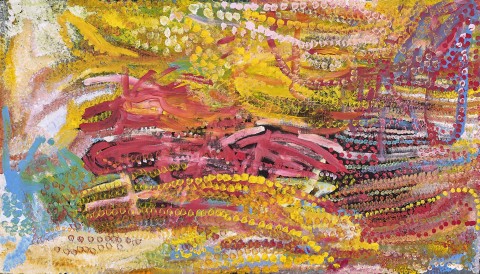MERNE (EVERYTHING), 1996
EMILY KAME KNGWARREYE
synthetic polymer paint on linen
122.0 x 213.0 cm
signed verso: Emlly [sic]
bears inscription verso: artist’s name, commissioned by Delmore Gallery, Delmore Gallery cat. 96A035
Commissioned by Delmore Gallery, via Alice Springs, Northern Territory
The Delmore Collection, Northern Territory
Private collection, Tasmania
Vivien Anderson Gallery, Melbourne
The Peter and Renate Nahum Collection of Aboriginal Art, London
This work is accompanied by a certificate of authenticity from Delmore Gallery, via Alice Springs.
Between the summer of 1988/89 and September 1996 at the remote settlement of Utopia, close to the Simpson Desert in the Northern Territory, an explosion of creativity by the Anmatyerre woman Emily Kngwarreye attracted worldwide attention and focussed the eyes of the artworld on Australian indigenous art. Although she was not the only artist producing work of cultural importance at that place and time, Emily’s paintings struck a chord with almost all who saw them and resulted in a global clamour for her work.
Renowned for her colourful and vibrant paintings, Emily Kngwarreye was deeply rooted in the Anmatyerre land of her ancestors to whom she paid respect through a lifetime of ceremony, dance, song and painting. Her art chronicled on canvas the ever-changing desert country of her homeland, Alhalkere. Located at the western edge of Utopia this triangular shaped country was where Emily was born and where she lived in the traditional ways of the eastern Anmatyerre, following a way of life that had continued from long before European presence. Her mark-making recorded the seasonal variations, sometime subtle, often dramatic, of the harsh desert environment and the explosion of growth that occurred after rain. Referred to as the ‘green time’1, the desert would come to life, wildflowers would carpet the red earth and plants and grasses would flourish, supplying the women with seeds, tubers and fruit.
Limited only by the reach of her arm over the surface of the canvas, Emily was celebrated for her strength and certainty of hand, developing a free-flowing style of painting and iconography based on the meandering linear pattern of the spread of the underground roots of the yam plant (Vigna Lanceolata). This design, and myriad variations upon it, would dissolve into fields of layered colour achieved through a build-up of dots upon dots and sometimes, as with this later painting, an added random array of powerfully gestural broad marks that added another layer to the work.
Merne (Everything) was produced in January 1996 and is an exemplar of Emily’s later style of painting as described by art historian Terry Smith who wrote, ‘where in contrast to almost all other desert painters, Emily makes no attempt to generate a repetitive pattern, rather, her mark making is to lay down individual strokes often starting from the edge of the canvas and moving in toward the centre as far as her reach extended, then sweeping back’.2 The work exudes energy and the sweeping lines and dots express a movement that takes your eye across all areas of the canvas. It is the gesture, the way that the paint has been applied, that dominates this painting. The gestural marks created by the expressive movement of Emily’s outstretched arm reveal the physical relationship between the artist and the canvas, lending the painting a human scale while at the same time describing a broad stretch of her country. As Janet Holt notes in the accompanying certificate, with its layers of multi-coloured dots and broad gestural strokes, Merne (Everything) is a celebration of nature, ‘the dramatic transformation of the desert from bare to abundant … a display of the desert’s power’.3
1. Isaacs, J., ‘Anmatyerre Woman’ in Isaacs, J., Smith, T., Ryan, J., Holt, D., and Holt, J., Emily Kame Kngwarreye Paintings, Craftsman House, Sydney, 1998, p. 13
2. Smith, T., 'Kngwarreye woman abstract painter', in Isaacs, J. et al., Emily Kngwarreye Paintings, Craftsman House, Sydney, 1998, p. 36
3. From the accompanying Delmore Gallery certificate of authenticity
CRISPIN GUTTERIDGE
